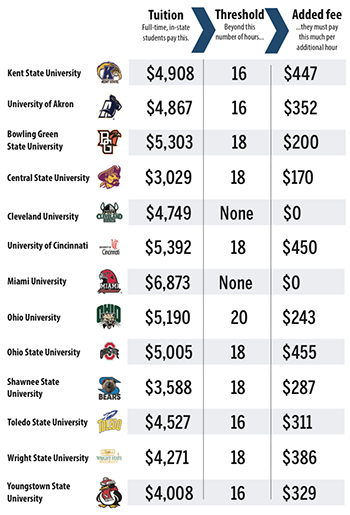Kent State’s credit-hour fee makes less money than anticipated

Click image to enlarge.
September 4, 2013
Kent State officials said last year that they needed to charge students for taking more credit hours to finance pressing renovation needs on campus.
School officials now say the fee that costs students an extra $447 per credit hour they register above 16 is bringing in less money than expected.
And Kent State’s increasing enrollment — resulting in unplanned tuition revenue — is picking up the slack.
In 2012, the fee brought in $2.6 million, Denise Zelko, associate vice president of university budget and financial analysis, said.
Administrators expected the charge to rack up $3.5 million, which would be used to help make annual debt payments of $11.1 million.
“I’m concerned and cautious about anything that falls short of the targets,” said Gregg Floyd, the university’s vice president of finance and administration. “We’ve been able to generate resources out of the strength of our enrollment that will hopefully help us take care of the need.
“As long as our enrollment exceeds our targets, the overall tuition revenues are adequate to take care of the debt retirement,” Floyd said.
The university has to pay back $170 million plus interest. In Fall 2012, students could take as many as 17 credit hours before being charged more. This year, it’s down to 16.
Students might be enrolling in fewer classes because they’re discouraged by the fee, Floyd said.
“It would be pure conjecture, but I would assume that was the case,” Floyd said. “I wouldn’t be surprised if they do drop” more credit hours.
Just before the fee was announced until Fall 2012, the average student workload remained stagnant, dropping slightly from 13.44 to 13.36 percent. More recent data is unavailable.
Officials said the fee was a result of the lack of money provided to the university by the state. Kent State did not invoke overload charges before 2012.
At $447, Kent State’s credit-hour fee is one of the most expensive in the state, only behind Ohio State University and the University of Cincinnati. Both of these schools, however, do not begin charging extra until a student enrolls in more than 18 hours (traditionally considered a full-time load).
Registering for 18 credit hours at Kent State costs $5,802, which is more expensive than almost any other public university in the state. Only Miami University charges more.
Students should not expect the credit-hour plateau to dip below 16 hours, Floyd said.
“The needs on campus had and have become dire, and we felt we had to raise the
resources from whatever manner we could do that was reasonable and fair,” Floyd said.
But credit-hour fees hurt students, Amy Laitinen, deputy director of higher education at the New America Foundation, a nonprofit, nonpartisan public policy institute based in Washington, D.C. said. The fee discourages them from graduating sooner.
Overload surcharges in particular create “perverse” environments that are at odds with the missions of public universities, she said.
“It’s doing poorly by students, and it’s not generating the revenue they wanted,” she said. “It makes no sense to keep this policy. It sounds like it’s all about money — their money, not students’.”
Kent State did not notify the Ohio Board of Regents, which oversees public universities, that it was implementing a credit-hour fee and is not required to, Jeff Robinson, spokesman for the Regents, said in an email.
The state is working to change the way it funds public universities, he said, by incentivizing schools to graduate more students. In other words, the more students that graduate, the more funding a college will receive.
“Decisions to impose credit hour fees are made by a school’s board of trustees, and only those trustees can determine whether they think such a fee is fair,” Robinson said. “I’m sure there are arguments on both sides of the issue.
Contact Rex Santus at [email protected].























